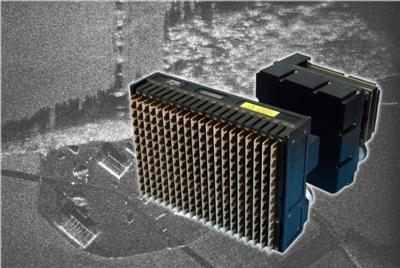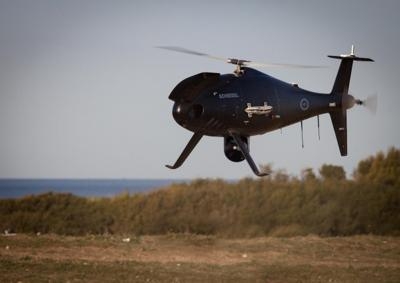Sun, Mar 05, 2017
Contract Signed With Scheible To Provide The System For Camcopter S-100
Leonardo has announced, at the Avalon airshow in Geelong, Australia, that the company has been selected by Austrian-based Schiebel to deliver its active electronically-scanned array (AESA) radar technology for the Camcopter S-100 unmanned air system (UAS) being provided to the armed forces of a North African nation. The radar, Leonardo’s PicoSAR, will be used to support border-monitoring and anti-terrorism surveillance missions. PicoSAR will be delivered in 2017 and go into service the same year.

This is the second time Leonardo’s PicoSAR radar has been chosen by Schiebel, the first being in support of a surveillance service contract. The two companies have also demonstrated a multi-sensor suite that included the PicoSAR and Leonardo’s SAGE electronic warfare system on the UAS to the Royal Australian Navy (RAN) and UK MOD, amongst others. Leonardo is promoting PicoSAR, as well as its Osprey 30 radar and SAGE system to Australia as sensor options for the UAS, which the RAN selected in December 2016.
PicoSAR packages advanced ‘electronically-scanning’ AESA technology into a small and lightweight unit ideally suited for unmanned vehicles. It is suitable for missions over both land and sea. The recent UK Ministry of Defence ‘Unmanned Warrior’ trial, a major UAS demonstration that was held to demonstrate the benefits of unmanned systems to the Royal Navy, saw Leonardo’s SW4-Solo unmanned rotorcraft as well as the Camcopter S-100 both equipped with Leonardo AESA radars and electronic warfare systems. During the trial, the sensors were proven to extend the surveillance of naval vessels and improve situational awareness. With the recent selection of Leonardo’s Osprey for the US Navy’s new MQ-8C Fire Scout UAS, Leonardo is emerging as the leading provider of sensors for the world’s most advanced unmanned rotorcraft.

UK-designed and manufactured, PicoSAR has been flown in Oceania, the Far East, the Middle East, Europe, North Africa, North America and South America. It has been acquired by more than 10 customers with 4 international orders being placed in 2016. PicoSAR is part of Leonardo’s portfolio of airborne surveillance and fire-control radars that includes best-in-class M-Scan (mechanically-scanning) systems as well as E-Scan (electronically scanning) systems. Both surveillance radars and fast-jet fire control radars are designed, manufactured and supported by Leonardo Airborne and Space Systems division.
(Images provided with Leonardo Company news release and from file)
More News
Ultrahigh Frequency (UHF) The frequency band between 300 and 3,000 MHz. The bank of radio frequencies used for military air/ground voice communications. In some instances this may >[...]
During The 7 Second Descent, There Was Another TAWS Alert At Which Time The Engine Remained At Full Power On October 24, 2025 at 2115 mountain daylight time, a Cirrus SR22T, N740TS>[...]
From 2009 (YouTube Edition): Educational Organization Aims to Inspire by Sharing Tuskegee Story Founding leader Don Hinz summarized the Red Tail Project’s mission in simple, >[...]
“This feels like an important step since space travel for people with disabilities is still in its very early days... I’m so thankful and hope it inspires a change in m>[...]
Also: New Katanas, Kern County FD Training, IndiGo’s Botched Roster, MGen. Leavitt Named ERAU Dean The Australian Transportation Safety Bureau (ATSB) has wrapped up its inves>[...]
 ANN's Daily Aero-Term (12.19.25): Ultrahigh Frequency (UHF)
ANN's Daily Aero-Term (12.19.25): Ultrahigh Frequency (UHF) NTSB Prelim: Cirrus Design Corp SR22T
NTSB Prelim: Cirrus Design Corp SR22T Classic Aero-TV: The Red Tail Project--Carrying the Torch of the Tuskegee Airmen
Classic Aero-TV: The Red Tail Project--Carrying the Torch of the Tuskegee Airmen Aero-News: Quote of the Day (12.19.25)
Aero-News: Quote of the Day (12.19.25) Airborne 12.17.25: Skydiver Hooks Tail, Cooper Rotax Mount, NTSB v NDAA
Airborne 12.17.25: Skydiver Hooks Tail, Cooper Rotax Mount, NTSB v NDAA




